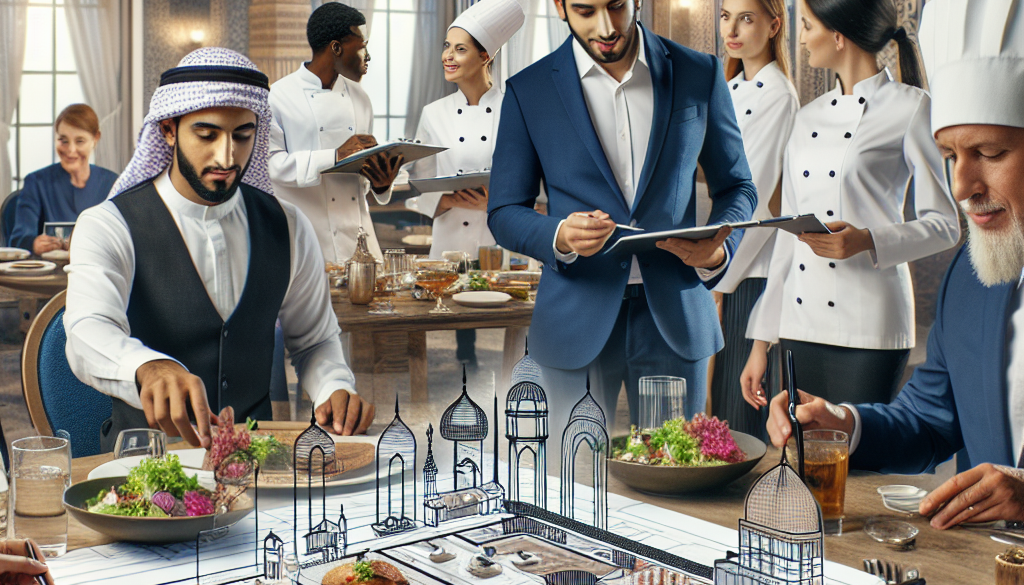Navigating Challenges in Food Service Design & Consulting
-
Table of Contents
- Food Service Design & Consulting: Mastering the Challenges
- Understanding the Landscape of Food Service Design
- Challenges in Food Service Consulting
- Strategies for Successful Food Service Design
- Adapting to Technological Advancements
- Complying with Health and Safety Regulations
- Designing for Operational Efficiency
- Managing Budget Constraints
- Ensuring Sustainability and Ethical Practices
- Dealing with Supply Chain Disruptions
- Conclusion: Synthesizing Success in Food Service Design
- Enhance Your Food Service with ETprotein’s Premium Protein Products
Food Service Design & Consulting: Mastering the Challenges

The food service industry is a dynamic and ever-evolving sector that demands constant innovation and adaptability. Food service design and consulting play a pivotal role in shaping the experiences of diners and the success of food establishments. However, professionals in this field often face a myriad of challenges that require strategic navigation. This article delves into the complexities of food service design and consulting, offering insights and strategies to overcome common obstacles.
Understanding the Landscape of Food Service Design
Food service design is not just about aesthetics; it’s a multifaceted discipline that encompasses operational efficiency, safety, customer satisfaction, and sustainability. A well-designed food service space can enhance workflow, reduce waste, and create an inviting atmosphere for patrons. However, achieving this balance is no small feat.
Challenges in Food Service Consulting
Consultants in the food service industry must be adept at identifying and addressing a range of issues that can impact a project’s success. From staying abreast of the latest trends to managing client expectations, the challenges are diverse:
- Adapting to Technological Advancements
- Complying with Health and Safety Regulations
- Designing for Operational Efficiency
- Managing Budget Constraints
- Ensuring Sustainability and Ethical Practices
- Dealing with Supply Chain Disruptions
Strategies for Successful Food Service Design
To navigate these challenges effectively, food service designers and consultants must employ a range of strategies:
- Conducting thorough market research
- Engaging in collaborative planning with stakeholders
- Implementing flexible design elements
- Utilizing data-driven decision-making
- Emphasizing training and education
Adapting to Technological Advancements
Technology is revolutionizing the food service industry, from point-of-sale systems to kitchen automation. Staying current with these advancements is crucial for consultants to provide relevant and forward-thinking advice. For instance, incorporating smart kitchen equipment can streamline operations and reduce labor costs.
Complying with Health and Safety Regulations
Health and safety are paramount in the food service industry. Consultants must ensure that designs meet local and international standards to protect both customers and staff. This includes considerations for food handling, storage, and preparation areas, as well as ventilation and sanitation systems.
Designing for Operational Efficiency
A well-designed kitchen and dining space can significantly impact the speed and quality of service. Consultants must create layouts that optimize the flow of staff and materials, reduce cross-contamination risks, and enhance the overall dining experience.
Managing Budget Constraints
Budget limitations are a common hurdle in food service design. Consultants must balance the desire for high-quality materials and equipment with the financial realities of their clients. This often requires innovative solutions and cost-effective alternatives that do not compromise on quality or functionality.
Ensuring Sustainability and Ethical Practices
Sustainability is increasingly important to consumers. Food service consultants must integrate eco-friendly practices into their designs, such as energy-efficient appliances, waste reduction systems, and sourcing from ethical suppliers.
Dealing with Supply Chain Disruptions
The global supply chain is vulnerable to disruptions, which can affect the availability of equipment and materials. Consultants must have contingency plans in place and maintain strong relationships with multiple suppliers to mitigate these risks.
Conclusion: Synthesizing Success in Food Service Design
Navigating the challenges in food service design and consulting requires a blend of creativity, technical expertise, and strategic thinking. By understanding the landscape, addressing the challenges head-on, and employing effective strategies, consultants can create spaces that are not only visually appealing but also operationally sound, safe, and sustainable. The key takeaways for success in this field include staying informed about technological trends, adhering to health and safety regulations, optimizing operational efficiency, managing budgets wisely, prioritizing sustainability, and being prepared for supply chain issues.
Enhance Your Food Service with ETprotein’s Premium Protein Products
For food service businesses looking to incorporate high-quality protein into their offerings, ETprotein’s range of organic bulk vegan proteins and L-(+)-Ergothioneine (EGT) products present an excellent opportunity. Their proteins are characterized by a neutral taste, non-GMO, allergen-free attributes, and high purity levels, making them ideal for various applications in the food and beverage industry. Whether you’re developing a new menu or enhancing existing dishes, ETprotein’s products can help you meet the growing demand for nutritious, plant-based options.
About ETprotein:
ETprotein, a reputable protein and L-(+)-Ergothioneine (EGT) Chinese factory manufacturer and supplier, is renowned for producing, stocking, exporting, and delivering the highest quality organic bulk vegan proteins and L-(+)-Ergothioneine. They include Organic rice protein, clear rice protein, pea protein, clear pea protein, watermelon seed protein, pumpkin seed protein, sunflower seed protein, mung bean protein, peanut protein, and L-(+)-Ergothioneine EGT Pharmaceutical grade, L-(+)-Ergothioneine EGT food grade, L-(+)-Ergothioneine EGT cosmetic grade, L-(+)-Ergothioneine EGT reference grade and L-(+)-Ergothioneine EGT standard. Their offerings, characterized by a neutral taste, non-GMO, allergen-free attributes, with L-(+)-Ergothioneine purity over 98%, 99%, cater to a diverse range of industries. They serve nutraceutical, pharmaceutical, cosmeceutical, veterinary, as well as food and beverage finished product distributors, traders, and manufacturers across Europe, USA, Canada, Australia, Thailand, Japan, Korea, Brazil, and Chile, among others.
ETprotein specialization includes exporting and delivering tailor-made protein powder and finished nutritional supplements. Their extensive product range covers sectors like Food and Beverage, Sports Nutrition, Weight Management, Dietary Supplements, Health and Wellness Products, and Infant Formula, ensuring comprehensive solutions to meet all your protein needs.
As a trusted company by leading global food and beverage brands and Fortune 500 companies, ETprotein reinforces China’s reputation in the global arena. For more information or to sample their products, please contact them and email sales(at)ETprotein.com today.












